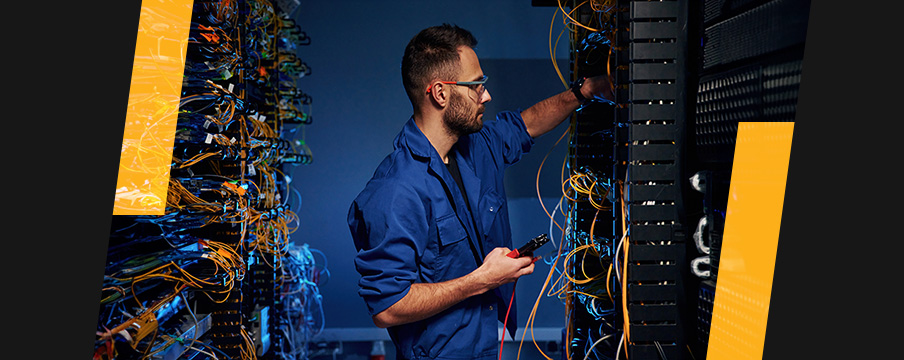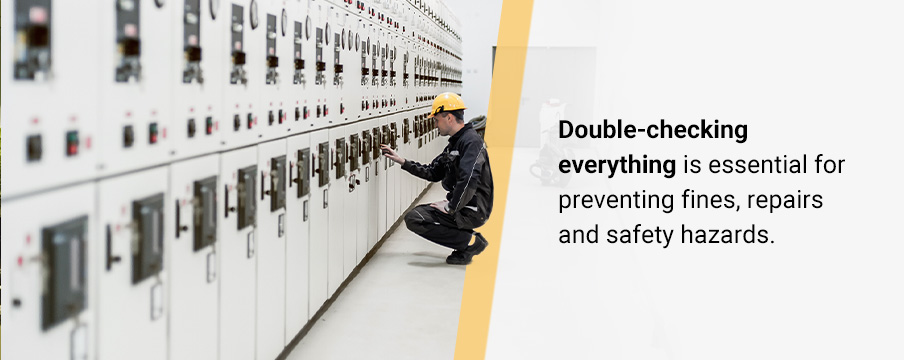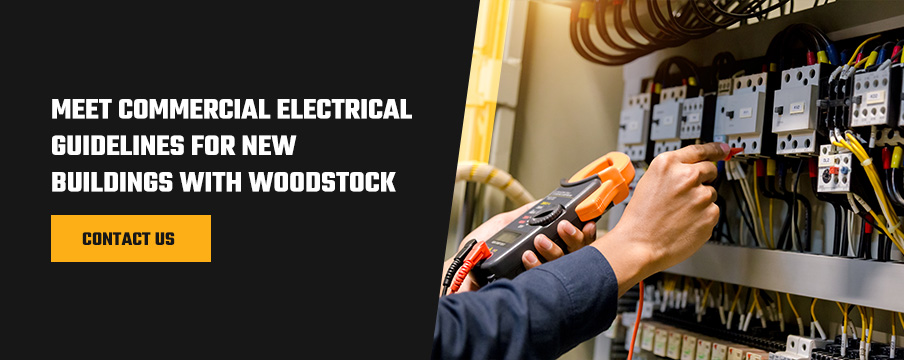Electrical Guidelines for Commercial Properties

Navigating commercial electrical systems can seem like a tall order. If you’re a property manager or owner overseeing new construction, you’ll need to know your electrical guidelines. Ensuring systems are up to code means staying compliant, safe and efficient. Violations can lead to fines and costly repairs or required changes, so it’s important to make sure your operation is adhering to code. While every application and operation is different and may require different or additional codes, there are general guidelines available to help you get started.
Understanding Commercial Electrical Code Requirements
Two main bodies oversee your commercial electrical requirements. The National Electrical Code® (NEC) and the National Fire Protection Association (NFPA) set the standard for safe commercial electrical design. Staying compliant is essential. These codes cover construction, regular maintenance and emergency power.
The NEC, in particular, is critical to your compliance as the codes dictate electrical system installation, maintenance and inspections. The NEC gets updated every few years to ensure it meets the latest safety standards. When you dive into the NEC, you’ll have all the information you need for your commercial building. With everything up to NEC code, you’ll protect your building and occupants from potential electrical issues.
Electrical Guidelines for Commercial Real Estate
Commercial property owners have specific obligations when it comes to maintaining electrical systems. Your specific requirements will change based on location and building size. But, the NEC and the NFPA have general requirements you’ll need to meet. Some critical guidelines include:
- Inspections: You’re required to regularly inspect your electrical equipment to avoid violations. Some systems even need inspections twice a year to ensure safety. Make sure you’re getting regular inspections by professionals during and after construction.
- Maintenance: The NFPA requires you to develop and use an electrical maintenance program (EMP). Maintenance is essential for keeping everything running smoothly and catching problems early.
- Emergency power: The NFPA and NEC outline requirements for emergency power systems in your building. Depending on your building’s use, these can change, but you need backup power to cut downtime and protect occupants.
- Documentation: You’ll also need detailed inspection, maintenance and corrective action records. A paper trail demonstrates your commitment to safety. It also proves your building is compliant with all relevant requirements.
Common Violations and How to Avoid Them

Following electrical guidelines for property management means avoiding safety hazards. There are common violations you might end up making. Double-checking everything is essential for preventing fines, repairs and safety hazards. Keep an eye out for these common violations to protect your building:
- Grounding problems: Improper grounding is a typical violation. Electrical systems need proper grounding to prevent shocks, equipment damage and fire. All metallic parts in your electrical system need to be bonded to the grounding system. Avoid grounding issues by hiring a qualified electrician for the job.
- Incorrect circuit breakers: Using the wrong circuit breaker size or type is a violation. Incorrect circuit breakers can cause overloading and even fires. Breakers must match the circuit amperage and purpose. Ensure you have the right circuit breakers and labeling.
- Overcrowded electrical panels: Overcrowding might also be an issue. When you’ve got too many wires or circuit breakers in one panel, it can cause trouble. You might see overheating and short circuits. Each panel has a specific capacity — exceeding this is a code violation.
- No backup power: Critical systems and buildings need to have backup power supplies. You need commercial backup generators or uninterruptible power supplies. Backup power needs correct sizing, regular testing and proper maintenance to keep it code compliant.
- Poor labeling: All electrical panels and circuits need clear, accurate labels. Labeling ensures quick identification during maintenance and emergencies. If your labels are missing or incorrect, it can cause dangerous mistakes. Regularly update and check all labels during maintenance.
Electrical Best Practices for Commercial Properties
You need to do more than understand electrical guidelines for landlords and commercial property owners. You also need to take action. Use these best practices to keep your property safe and compliant. Start with these key areas and go from there:
1. Fire Safety
Smoke detectors and fire alarms prevent fire injuries and property damage. Commercial buildings need fire systems hardwired into the electrical with a backup battery. Separate backup power for fire safety systems ensures continuous operation. Regularly test and maintain your fire systems to ensure they’re working. Smoke detectors need annual testing and semiannual visual inspections to maximize safety.
2. Regular Maintenance and Inspections
Regular maintenance and inspections are the backbone of compliance. Your electrical systems need regular inspections to stay compliant. Inspections include looking for signs of wear in the system. You’ll also need to test all safety devices, like surge protectors and circuit breakers. Checking everything at least once a year helps you catch problems early.
Maintenance varies depending on the electrical components. Generally, you’ll need to keep everything clean, water-free and protected from pests. Maintenance also includes regular generator testing, replacing components and maintaining work records. Keep on top of maintenance to ensure everything is in top condition.
3. Backup Power Systems
Backup power is essential for protecting your operation from an outage. Critical systems like emergency lighting and fire alarms need backup power. Additionally, you should consider investing in a commercial generator. A generator keeps you code-compliant while protecting you from downtime and safety hazards. Ensure your generator is the right size to handle the electrical load during an outage.
4. Emergency Lighting
Emergency lighting is another must for commercial buildings. All exits and pathways should be visible and illuminated during an emergency. These lights need backup power to work during power outages. Keep your emergency lights well-maintained and tested. You always want occupants to be able to get out during an emergency.
5. Documentation
Electrical paneling, switches and circuits need correct labeling. Clear labels protect electrical workers while doing maintenance or emergency work. If you want to reduce the risk of mistakes and stay compliant, you need clear labeling. Additionally, always have good documentation on your inspections, repairs and upgrades. With good documentation, you can always prove your compliance if required.
Meet Commercial Electrical Guidelines for New Buildings With Woodstock Power
Staying compliant with electrical requirements means investing in quality equipment. A reliable generator can meet the requirements for a backup power supply. Woodstock Power offers high-quality commercial generators you can trust. Our wide selection of top brands is available for immediate shipping. We buy, sell and rent generators to ensure you get the right fit.
Headquartered in Philadelphia, PA and operating nationwide – our experts are ready to assist you. We can help you find the best selection in our inventory based on:
- Peak and average power requirements
- Preference for natural gas or diesel fuel
- Portable and stationary power
- Prime and standby generator requirements
- Available space and exhaust restrictions
You can rely on generators from Woodstock Power because they’ve been inspected, serviced and verified. Any generators that are not up to par with industry standards undergo all necessary repairs and modifications to ensure you receive a full turnkey generator that’s ready to go!
Woodstock Power’s wide selection of generator sets means we’re confident we can find the right model for your operations and budget. If you’re looking to upgrade from an older model generator, we also buy used generators in good quality.
Contact us to learn more about the quality of products and services we provide. Call us at 610-658-3242 or fill out our contact form today!


